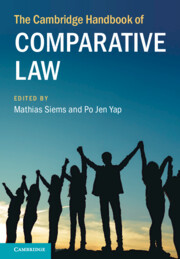Book contents
- The Cambridge Handbook of Comparative Law
- The Cambridge Handbook of Comparative Law
- Copyright page
- Contents
- Figures
- Tables
- Contributors
- Preface
- Abbreviations
- 1 Introduction
- Part I Methods of Comparative Law
- Part II Legal Families and Geographical Comparisons
- 11 Civil Law
- 12 Common Law
- 13 Confucian Legal Tradition
- 14 Former Soviet States of Eastern Europe, Caucasus and Central Asia
- 15 Latin America
- 16 Middle East and North Africa
- 17 South Asia
- 18 Sub-Saharan Africa
- Part III Central Themes in Comparative Law
- Part IV Comparative Law beyond the State
- Index
16 - Middle East and North Africa
from Part II - Legal Families and Geographical Comparisons
Published online by Cambridge University Press: 26 January 2024
- The Cambridge Handbook of Comparative Law
- The Cambridge Handbook of Comparative Law
- Copyright page
- Contents
- Figures
- Tables
- Contributors
- Preface
- Abbreviations
- 1 Introduction
- Part I Methods of Comparative Law
- Part II Legal Families and Geographical Comparisons
- 11 Civil Law
- 12 Common Law
- 13 Confucian Legal Tradition
- 14 Former Soviet States of Eastern Europe, Caucasus and Central Asia
- 15 Latin America
- 16 Middle East and North Africa
- 17 South Asia
- 18 Sub-Saharan Africa
- Part III Central Themes in Comparative Law
- Part IV Comparative Law beyond the State
- Index
Summary
Globalisation has brought the world closer and urged nations to consider the differences between their various legal systems. Comparative law is vital to facilitating this. There are many reasons for the discipline to consider the legal systems of the Middle East and North Africa (MENA) region. The MENA population does not only represent a large part of the world, but the MENA region also has attractive markets with active investment opportunities. Recent studies indicate a remarkable move towards foreign investment in the MENA region business market. This chapter provides an overview of the fundamentals of the MENA region’s legal systems. What is new about this study is that it does not adopt the classical approach of examining Islamic law as the legal cornerstone in this area of the world. Rather, the chapter provides a comparison between the impact of Western laws – founded initially on either the Napoleonic Code or common law doctrines – versus the impact of Islamic law ‘Shari‘a’ on building the legal systems of the MENA countries. The chapter also gives examples of the role of comparative law in shaping some contemporary issues in the MENA countries today, such as migration and women’s rights.
- Type
- Chapter
- Information
- The Cambridge Handbook of Comparative Law , pp. 331 - 342Publisher: Cambridge University PressPrint publication year: 2024



